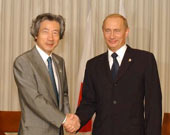Putin delays visit to Japan because of territorial dispute
A peace treaty between the two countries is possible only if Russia passes islands to Japan
Russia and Japan celebrated one of the most important dates in the history of interstate relations yesterday. Russia and Japan signed the Shimoda Treaty 150 years ago - on 7 February, 1855. The document about borders and commerce became the first official agreement that triggered bilateral relations between the two countries. It became a landmark event indeed, although it did not receive adequate honors either in Russia or in Japan yesterday. 
The 150th anniversary of the treaty, which was concluded by admiral Putyatin, coincided with the so-called Northern Territories Day, which is celebrated in Japan every year. There is nothing incidental about the coincidence. The treaty stipulates that the border between the two countries runs between the islands of Urup and Iturup. These are the islands that were passed to Japan (Iturup, Shikotan, Kunashir and Khabomai), although Tokyo currently sets claims for them.
The 60th congress of the “Movement for the Return of Northern Territories” was opened in Tokyo yesterday. Japanese Prime Minister Junichiro Koizumi stressed out in his message to the members of the congress that it would be possible to sign a peace treaty with Russia only after the latter returns the disputed islands to Japan.
Russia had its own way of celebrating the Northern Territories Day. A meeting took place in front of the building of the Japanese Consulate General in Sakhalin yesterday. Sakhalin citizens gathered to protest against Japan's claims for South Kurile islands.
A lot of observers say that a new outburst of the island dispute occurred three months ago, when Russian Foreign Minister Sergei Lavrov stated in one of TV programs that Russia was ready to abide by obligations of the 1956 Soviet-Japanese declaration. According to the document, Moscow was ready to consider the issue about passing two islands to Japan – Shikotan and Khabomai – after the signing of the peace treaty between the two countries. Tokyo asks for all islands before the treaty can be signed – that was exactly the way Japan reacted to the statement from the Russian foreign minister.
In spite of the fact that Russia and Japan emphasize their interest in developing the mutual cooperation, the territorial problem has become a bone of contention in the bilateral relations again. This is probably the reason why nothing is clear about President Putin's visit to Japan. Putin was originally supposed to arrive in Tokyo in the beginning of February. The visit, therefore, was supposed to coincide with the current anniversary. The trick was linked with the above-mentioned marking of the Northern Territories Day on February 7th. Vladimir Putin's visit to Japan on such days would give quite an ambiguous connotation to the matter. The Russian president did not go to Japan as a result. Japanese newspapers write that Putin will probably come in April-June – before or after the celebration of the 60th anniversary of the victory in WWII. A later date is not likely for Japan, though. August will be marked with another landmark date: the USSR went to war with Japan 60 years ago. It is noteworthy that Japan was deprived of the Kurile islands and the southern part of Sakhalin as a result of that war.
Current relations between Russia and Japan are a bright example to show how the burden of the past can affect the present. It is not very easy to get rid of this burden. No one doubts in Russia that Japan will not receive the four disputed islands, taking into consideration Tokyo's claims about it. It is also hard to imagine what can make Japan turn down its claims or set forth a compromise that would be good to both sides at least to a certain extent. Apparently, there will be no progress achieved on the matter.
Subscribe to Pravda.Ru Telegram channel, Facebook, RSS!




